yeovil at War
Edward Waters Harbin Marsh
Drowned at sea while on active service
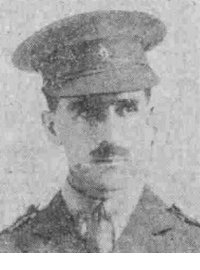 Edward
Waters Harbin
Marsh was the
son of Yeovil
solicitor
William Marsh
(1851-1920) and
Agnes Elizabeth
née Waters
(1851-1942).
Edward was born
in Yeovil in
1880 and
baptised on 6
June 1880 at
St John's church.
Edward
Waters Harbin
Marsh was the
son of Yeovil
solicitor
William Marsh
(1851-1920) and
Agnes Elizabeth
née Waters
(1851-1942).
Edward was born
in Yeovil in
1880 and
baptised on 6
June 1880 at
St John's church.
In the 1881 census William and Agnes were recorded living at a villa on Preston Road, near Summerlands. Living with them were their children; Evelyn (b1876), Florence (b1877), Agnes (b1879) and one-year old Edward, together with William's 17-year old brother in law Edward Waters, a solicitor's law clerk, and three domestic servants.
By the time of the 1891 census the family had moved to 11 Princes Street, known as Old Sarum House. A new son, Kenneth, had been born and a new law student was living with the family as well as four domestic servants. William was a partner in the law firm of Mayo & Marsh, but was to be a partner in the firm of March & Macauley-Bennett by 1895.
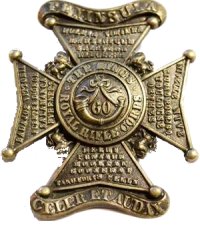 During the
1890s Edward
enlisted in the
army and by the
end of the
decade he was a
Lieutenant in
the Mounted
Infantry of the
60th Rifles (the
King's Royal
Rifle Corps).
Mounted Infantry
steadily grew in
importance after
1880 and
achieved its
greatest size
and
effectiveness in
the South
African War.
During the
1890s Edward
enlisted in the
army and by the
end of the
decade he was a
Lieutenant in
the Mounted
Infantry of the
60th Rifles (the
King's Royal
Rifle Corps).
Mounted Infantry
steadily grew in
importance after
1880 and
achieved its
greatest size
and
effectiveness in
the South
African War.
A mounted infantryman was a soldier who was armed with infantry weapons but who rode, rather than marched, usually on a horse. Unlike the cavalryman's mount, which was an extension of the man and therefore of his weapons, the mounted infantryman's horse was merely a conveyance to afford him greater mobility and speed of manoeuvre, his weapons still being used on foot.
It is likely that Edward took part in the Battle of Baakenlaagte on 30 October 1901, during the guerrilla phase of Anglo-Boer war of 1899–1902 (the Second Boer War). The battle saw the Eastern Transvaal Boer commandos of Generals Grobler, Brits, Viljoen and Louis Botha attack the rear guard of Colonel Benson's much feared No 3 Flying Column while it was in marching formation to its base camp. In this action the King's Royal Rifles were represented in the force by the 25th Battalion Mounted Infantry. The 25th Mounted Infantry was composed of one company from the 1st Battalion, two companies from the 4th Battalion, and one company from the 3rd Battalion King's Royal Rifles.
After serving in the Second Boer War Edward was gazetted to the South Lancashire Regiment. He went to India with them and then transferred to the 13th Rajputs Regiment of the Indian Army, in which he served as a Lieutenant. Originally an infantry regiment of the Bengal Army, and later of the British Indian Army, the regiment went through a number of name changes until finally in 1903, after the Kitchener reforms of the Indian Army, it became the 13th Rajputs (The Shekhawati Regiment).
The badge at left is that of a 13th Rajputs Officer`s field service cap badge circa 1903-22 as would have been worn by Edward. British made and of die-cast silver, it displays crossed katars (punch daggers) with an applied gilt "13" between the handles.
The regiment was part of the Indian Army and was the force recruited locally and permanently based in India, together with its expatriate British officers (as opposed to the British Army in India that consisted of British Army units posted to India for a tour of duty, and which would then be posted to other parts of the Empire or back to the UK).
Defence of the North-West Frontier against foreign aggression was the army's primary role while maintaining internal security was a secondary role, in support of the police. Edward spent the years before the Great War in this role although in the 1911 census of military personnel on foreign service, 30-year old Edward was listed as an unmarried Lieutenant of Indian Infantry but "absent aboard ship".
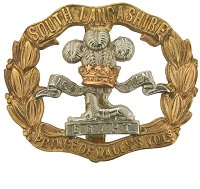 In August 1914
Edward was at
home on leave
but when war was
declared he was
immediately
recalled to his
regiment in
India. However
this order was
cancelled and he
was attached to
the 6th
(Service)
Battalion, South
Lancashire
Regiment as
Adjutant. In May
1915 he had a
temporary
posting with
other Indian
officers to
France, to
replace losses
of the Indian
Contingent,
rejoining his
regiment after
three weeks of
trench warfare
on the Western
Front.
In August 1914
Edward was at
home on leave
but when war was
declared he was
immediately
recalled to his
regiment in
India. However
this order was
cancelled and he
was attached to
the 6th
(Service)
Battalion, South
Lancashire
Regiment as
Adjutant. In May
1915 he had a
temporary
posting with
other Indian
officers to
France, to
replace losses
of the Indian
Contingent,
rejoining his
regiment after
three weeks of
trench warfare
on the Western
Front.
The regiment sailed from Avonmouth in June 1915, landing at Cape Helles (Gallipoli). The Gallipoli Campaign, also known as the Dardanelles Campaign, was a campaign that took place on the Gallipoli peninsula in the Ottoman Empire between 25 April 1915 and 9 January 1916. The peninsula forms the northern bank of the Dardanelles, a strait that provides a sea route to what was then the Russian Empire. Intending to secure it, Russia's allies Britain and France launched a naval attack followed by an amphibious landing on the peninsula with the eventual aim of capturing the Ottoman capital of Constantinople (modern-day Istanbul). The naval attack was repelled and, after eight months' fighting, with many casualties on both sides, the land campaign also failed and the invasion force was withdrawn to Egypt. The campaign was one of the greatest Ottoman victories during the war and a major Allied failure.
The South Lancashire Regiment, as part of 13th Division, took part in the Suvla Bay Expedition and Edward was one of the men to reach the top of the infamous Kiretch Tepe Ridge. Unfortunately Edward was severely wounded in this engagement.
After recovering from his wounds Edward, by this time a Captain, was ordered to return to India to rejoin his unit, the 13th Rajputs. He left for India aboard the SS Persia - a defensively armed passenger vessel out of Tilbury, for Port Said, Aden and Bombay - in December 1915. However Persia was sunk off Crete, while the passengers were having lunch, on 30 December 1915, by German World War I U-Boat ace Max Valentiner (commanding SM U-38). Persia sank in five to ten minutes, killing 343 of the 519 aboard, Edward being one of those killed. He was 35 years old. The sinking was highly controversial, since it broke naval international law, or the "Cruiser Rules", which stated that merchant ships could be stopped and searched for contraband, but could only be sunk if the passengers and crew were put in a place of safety (for which, lifeboats on the open sea were not sufficient). Instead, the U-Boat fired a torpedo with no warning, and made no provision for any survivors. This action took place under Germany’s policy of unrestricted submarine warfare, but broke the Imperial German Navy’s own restriction on attacking passenger liners, the Arabic pledge.
The Western Gazette, in its edition of 7 January 1916, reported "Amongst the passengers of the ill-fated Persia, torpedoed last week in the Mediterranean, was Captain EWH Marsh, elder son of Colonel and Mrs Wm. Marsh, of Old Sarum House, and who had recently been in the town on sick leave following recovery from a wound received in Gallipoli. Captain Marsh was returning to India to rejoin his old regiment, the 13th Rajputs, in which he had obtained promotion. His name has not appeared amongst the published lists of survivors, and the great anxiety is felt as to his safety."
In its edition of 8 February 1916, Pulman's Weekly News reported "Captain EWH Marsh, 13th Rajputs “The Shekhawati Regiment,” whose name is, unhappily, not yet included in the list of survivors from a ship recently sunk, is the elder son of Colonel and Mrs W Marsh, of Old Sarum House, Yeovil. At the outbreak of war he was at home on leave from India, and was at once ordered to rejoin his regiment in India. This order was cancelled a few hours before the ship sailed, and shortly afterwards, he was attached to the 6th Battalion, South Lancashire Regiment, being appointed Adjutant. In the month of May he was sent to France temporarily with other Indian officers, to replace losses in the Indian Contingent, but after three weeks in the trenches, he was able to re-join the South Lancashires. His regiment proceeded to Gallipoli with the 13th Division, in July, and took part in the Suvla Bay Expedition, being one of the units to reach the top of the celebrated crest, during which operation, Captain Marsh was severely wounded. Upon his recovery he was ordered to return to India, and he was proceeding thither when the disaster occurred. The family still hope that they may hear of his safety. Captain Marsh had had previous war experience, having served as Lieutenant in the Mounted Infantry of the 60th Rifles in the Boer War. After this he joined the South Lancashire Regiment, from which he exchanged into the India Army. Captain Marsh was a well-known figure in Yeovil and the neighbourhood, and was held in the greatest esteem and admiration by all who knew him. His quiet, unassuming manner and his true soldierly character had gained him the respect of all classes, who remember his keen anxiety to go on immediate service at the outbreak of hostilities. Now that everything points to the fact that such a career of service has been cut short, and the utmost sympathy is extended to Colonel and Mrs. Wm. Marsh, whose grief may be tempered with the knowledge that if Captain Marsh has died, he died like a soldier and a hero and as surly in the service of King and Country as though falling on some stricken field.
Edward Marsh is commemorated on the Chatby War Memorial, Alexandria, Egypt, and his name is recorded on the War Memorial in the Borough.
gallery
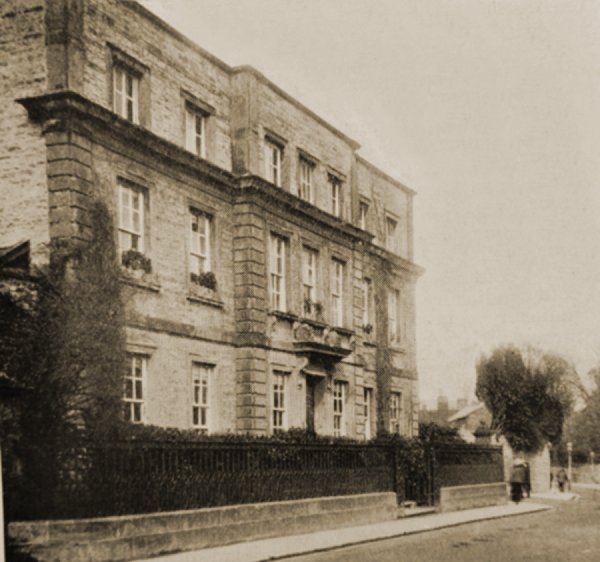
Old Sarum House photographed in 1906. At this time it was the home of the Marsh family.
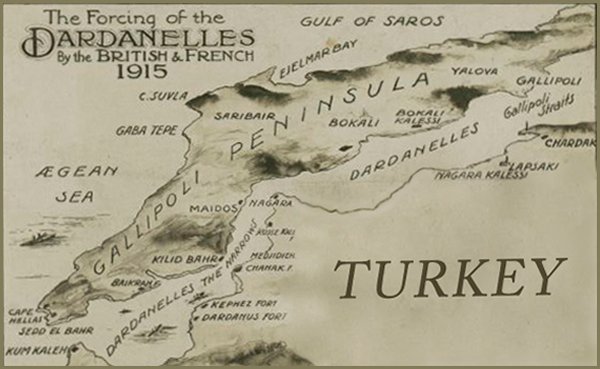
A postcard dated 1915 showing a map of the Dardanelles Campaign.
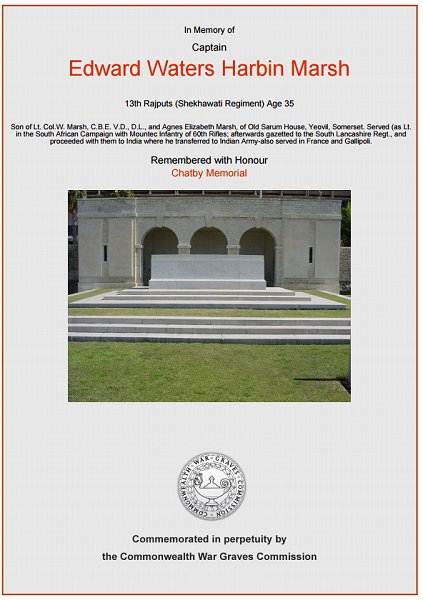
The Commonwealth War Graves Commission's certificate in memory of Edward Marsh.